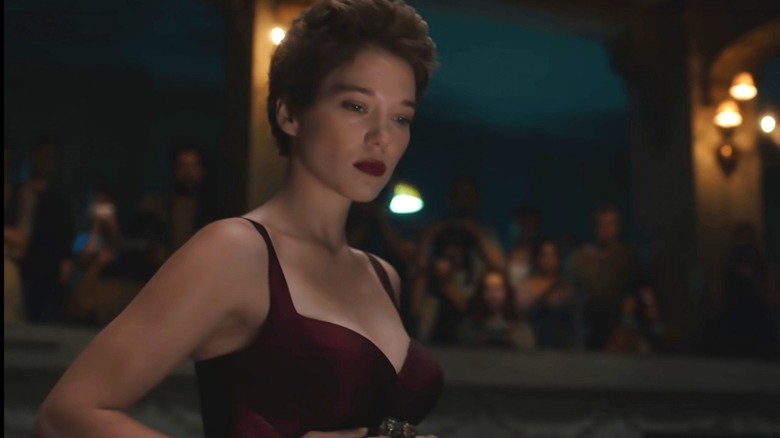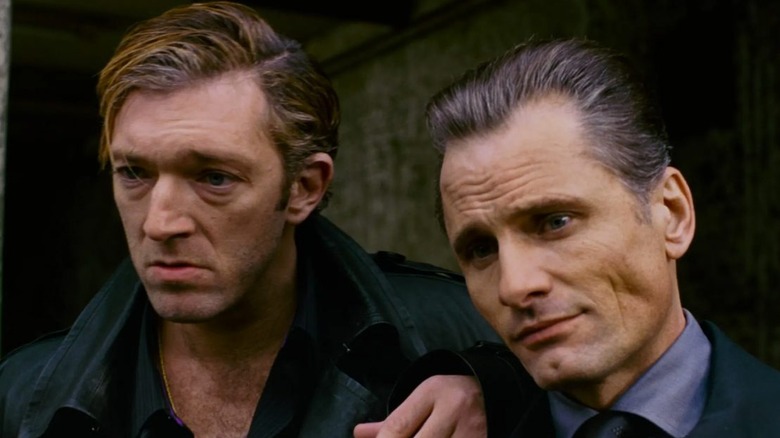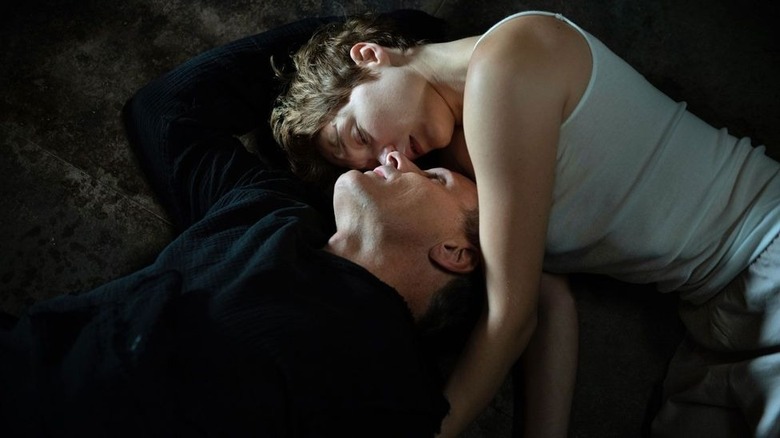David Cronenberg Never Would Have Written The Shrouds If It Hadn't Been For Netflix
Are streamers killing indie cinema, or could Netflix be a lifeline for ground-breaking filmmaking? There are solid arguments for both sides, but David Cronenberg firmly believes that streaming services are the future. He knows that streaming has changed the way we watch movies, for better or worse, and has chosen to embrace this change rather than reject it. In fact, the writer-director's upcoming film "The Shrouds" was originally written as a Netflix series.
"The Shrouds" is set to star Vincent Cassel alongside Léa Seydoux. Seydoux starred in Cronenberg's 2022 film "Crimes of the Future" and has appeared in Bond movies and Wes Anderson movies alike. Cassel had his breakout role in the contemporary cult classic "La Haine" and has gone on to star in "Ocean's 12" and "Black Swan." He also collaborated with Cronenberg on "Eastern Promises" and "A Dangerous Method."
Cassel will star as a businessman who invents a device that can connect directly to the bodies of dead loved ones, right after his wife passes away, per Variety. When his wife's grave is vandalized, he is forced to confront his unresolved grief as he solves the mystery of the attack. "It's a very personal project for me," Cronenberg told Deadline. "People who know me will know parts of it are autobiographical."
Cronenberg originally wrote the film as a Netflix series, Indiewire reported. The streaming service paid him to develop the concept but walked away after two episodes. "I think they're very conservative and for whatever reason, they didn't go ahead with my project," the director explained. "I still thanked them because I wrote a script and I wouldn't have done that if it hadn't been for their enthusiasm."
'Streaming in cinematic terms'
Financing independent and ground-breaking cinema is never a safe bet, and it's always been hard to get funding. But with the pandemic calling the future of cinema into question, there's even less money to go around. "Right now, if you're doing a film with Netflix, then you don't have to worry about money because Netflix has a lot of money," Cronenberg told Variety. "But if you're doing an independent film and you don't have Netflix, then it's a struggle."
It's great that Netflix is willing to fund independent filmmakers, but their formulaic productions are bound to subdue any auteur's artistic touch. "I think that they're still very conservative," Cronenberg admitted.
"I mean, I think they're still like a Hollywood studio. I thought maybe they would be different. The difference is that Netflix can show very interesting streaming series from Korea, from Finland, and they say it's a Netflix original, but it isn't really — it's something they have acquired. But I think when it comes to their actual production that they do themselves, they're very conservative. I think they think in mainstream terms, that's my experience with them anyway."
The director was initially intrigued by developing a streaming series, and was excited by the challenge of a new media format. "I was disappointed because I was interested in streaming in cinematic terms," he explained. "I thought that would be a very interesting experience for me as a writer, as a creator, and then also as a director." He saw a Netflix series as "an alternative form of cinema, because suddenly you're making eight or 10 hours of film," per Indiewire. Sadly, Netflix just wasn't ready for Cronenberg — not yet, anyway.
A streaming series of the future
Netflix may be too "conservative" for David Cronenberg, but that doesn't mean the director dislikes streaming services altogether. He isn't interested in preserving the sanctity of cinema. In fact, when asked if he agreed with Pedro Almodóvar that cinema is sacred, Cronenberg replied, "you must perhaps be a Catholic in order to believe that" (via VPro Cinema).
The director is excited by the global potential of streaming services. "If you make a movie for Netflix, it might never be seen on a cinema screen, but in one day it will be released in 190 countries," he pointed out. He's willing to debate if Netflix's productions, or even their acquisitions, can truly be considered cinema without being shown in a movie theater. But Cronenberg doesn't mind adapting to the changing world, even if it means a new viewing experience.
"I wouldn't mind seeing 'Lawrence of Arabia' on an Apple Watch," the director insisted. "It would be a different movie, but it would be interesting." The "Videodrome" director has always embraced emerging forms of media and media capturing. "In fact," Cronenberg told Deadline, "there are some moments in 'Crimes of The Future' that were shot with an iPhone. I won't say which but you can probably figure it out."
But what could possibly keep people coming back to the theater, after all these years? "Nostalgia," Cronenberg replied. "It will be a retro activity, going to a cinema [...] [like] people who still type on typewriters." Going to the movies isn't a religious activity — it's a nostalgic one. The movie theater is an indulgence, a mirror into the past. It feels spiritual because we are being haunted by the spectre of cinema.


